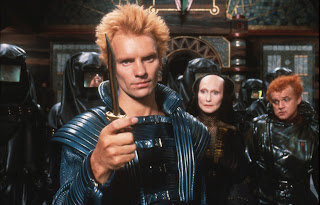I recently listened to Dune on audiobook after being thoroughly impressed by the movie. The action/thriller sci-fi novel depicts a sort of Gulf War in space. Where oil is the essential commodity here on earth, powering our entire society and forcing unending conflict due to its finite nature, "spice" is the resource at the heart of Dune. It's what makes space travel and cosmic civilization possible, the parallels are uncanny.
So in some sense, you can almost imagine an obnoxious allegory taking shape; the spice is mined on the desert planet of Arrakis (hard not to hear in all its audiobook glory as pronounced like "Iraq - is"), which is inhabited by a fanatically religious desert people known as Fremen (get it, like Free MEN), who are leveraged against a Soviet Unionesque former hegemony society and ultimately against the very embodiment of imperialism itself; the emperor.
So...yes, it's the Gulf War in space.
Yet there is a lot to make Dune more interesting than the sum of its borrowed political plot. The action in Dune is truly exhilarating. Action scenes in books have been hard-pressed to excite since movies got extremely good at them. Yet the various fights and battles in Dune don't disappoint. The cast of combatants has a range of often discussed reputations, very Game of Thrones reminiscent, that has any reader looking forward to the eventual clash.
The other really interesting component of the action in Dune is how all of the fighting is done entirely with knives, not swords; knives. There is zero explanation for why this is the case, but it works. The fighting is intimate and Herbert writes riveting engagements whether they're one on one duels or epic skirmishes between armies. I feel like a kid again writing about this, but it really is fun!
The politics of Dune is also more interesting than the Gulf War it's modeled after and the lesson is far from a contrived regurgitation of the status quo. Protagonist Paul Atreides; a prodigal son trope who eventually leads the Fremen in their "Jihad" (actual word used) against the empire, clearly struggles with waging a holy war and it's not very clear at the end of the novel that he has made the right choice, a quandary the reader is likely to share.
The Fremen are also written in a refreshingly complicated way. Many of their brutal traditions are unforgivable, even as you're forced to acknowledge they're born from a life in an almost uninhabitable, incredibly hostile desert planet. But they also have ecological ambitions, hoping to turn Arrakis into a green planet, which would likely mean an end to spice production. The dynamic political conflict that's ultimately set up is the Fremen raging against the empire's colonial rule, desiring to end their extraction of finite resources so they can reverse the destruction of their planet on one side and Paul on the other trying to harness this power with the reader guessing if he's helping the Fremen, using them for his own revenge, or just accidentally causing untold destruction/bloodshed/end of civilization.
Herbert works intricately to dismantle the reader's usual reliance on the idea that the protagonist, even a "chosen one", is always right. Imagine if Luke Skywalker's destruction of the Emporer caused inter-planetary economic devastation and unleashed bloodthirsty Ewoks who committed eco-terrorism to protect their forest planet. Imagine if, in Avatar, society could not function without unobtanium, and Sully + the indigenous population of the planet caused cataclysmic destruction by preventing people from mining it.
This makes Dune a complicated anti-war, ecological-focused novel, one that assures us the victor in any war, whether their cause is to justly protect their lands or greedily prevent societal collapse, is still only the victor of a war. Paul and the Fremen must balance between the liberation of land and resources (especially water, which the Fremon ironically hold in much higher regard than spice) to be used for the good of all people or complete destruction so a few may no longer profit. The message then is that transforming society is a collaborative effort. A thin strain of possibility exists for this outcome in the novel, the reader is certainly hoping for it by the end.

